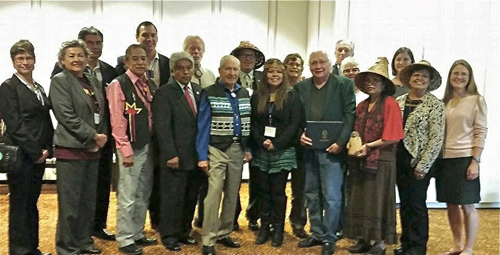
CAMBRIDGE, MASS, OCT 29 – From more than 60 applicants, six tribal governance programs have been selected as 2014 Awardees by the Harvard Project on American Indian Economic Development’s Honoring Nations program. The Honoring Nations awards identify, celebrate, and share excellence in American Indian tribal governance. At the heart of Honoring Nations is the principle that tribes themselves hold the key to generating social, political, cultural, and economic prosperity and that self-governance plays a crucial role in building and sustaining strong, healthy Indian nations.
Calling them trailblazers, Chairman of the Honoring Nations Board of Governors Chief Oren Lyons (Onondaga) says, “the 2014 Honoring Nations awardees look down the long road and don’t get lost in the demands of the moment. They are about our future, and the children coming, and the responsibilities of all leaders to their nations.”
Administered by the Harvard Project on American Indian Economic Development at Harvard Kennedy School, Honoring Nations is a member of a worldwide family of “governmental best practices” awards programs that share a commitment to the core idea that government can be improved through the identification and dissemination of examples of effective solutions to common governmental concerns. At each stage of the selection process, applications are evaluated on the criteria of effectiveness, significance to sovereignty, cultural relevance, transferability, and sustainability. Since its inception in 1998, 118 tribal government programs and three All-Stars programs have been recognized from more than 80 tribal nations.
Honoring Nation’s Program Director Megan Minoka Hill (Oneida Nation WI) states, “Honoring Nations shines a light on success in Indian Country to share valuable lessons that all local governments, Native and non-Native, can learn from to better serve their citizens.”
Presentations and dissemination of the work of the 2014 awardees will include exhibits at the Smithsonian Institution, a web platform through Google Cultural Institutes, written and video reports and case studies, executive education curriculum, and national presentations.
The 2014 Honoring Nations awardees are:
- The Lummi Nation’s Wetland and Habitat Mitigation Bank: A bank of tribal wetlands habitat set aside and preserved to sell as “credits” to offset the impact of on- and off-reservation development projects that impact wetlands habitat.
- Port Gamble S’Klallam Tribe’s Child Welfare Program: Tribal child welfare services provider that administers Social Security Act programs to provide culturally reflective programs and services and keeps S’Klallam children in S’Klallam homes.
- Ohkay Owingeh Pueblo’s Owe’neh Bupingeh Rehabilitation Project: A complex project to rehabilitate and restore homes in the “Pueblo core” of the community, preserving the core’s 700+ year-old structures while modernizing homes for 29 families.
- The Citizen Potawatomi Nation’s Potawatomi Leadership Program: A six-week summer internship program for college-student Potawatomi citizens to work in the tribal government offices and gain a more thorough knowledge of tribal organization, thereby increasing their capacity as future tribal leaders.
- The Shakopee Mdewakanton Sioux Community’s Role in the Scott County Association for Leadership and Efficiency (SCALE): A local collaborative association of tribal and municipal governments to increase efficiency and cooperation among agencies and governments in Scott County, Minnesota.
- The Swinomish Indian Tribal Community’s Climate Change Initiative: A thorough initiative that incorporates assessment of current and forecast climate change impacts on the tribal community and resources, and a plan with tools for establishing mitigation strategies.
